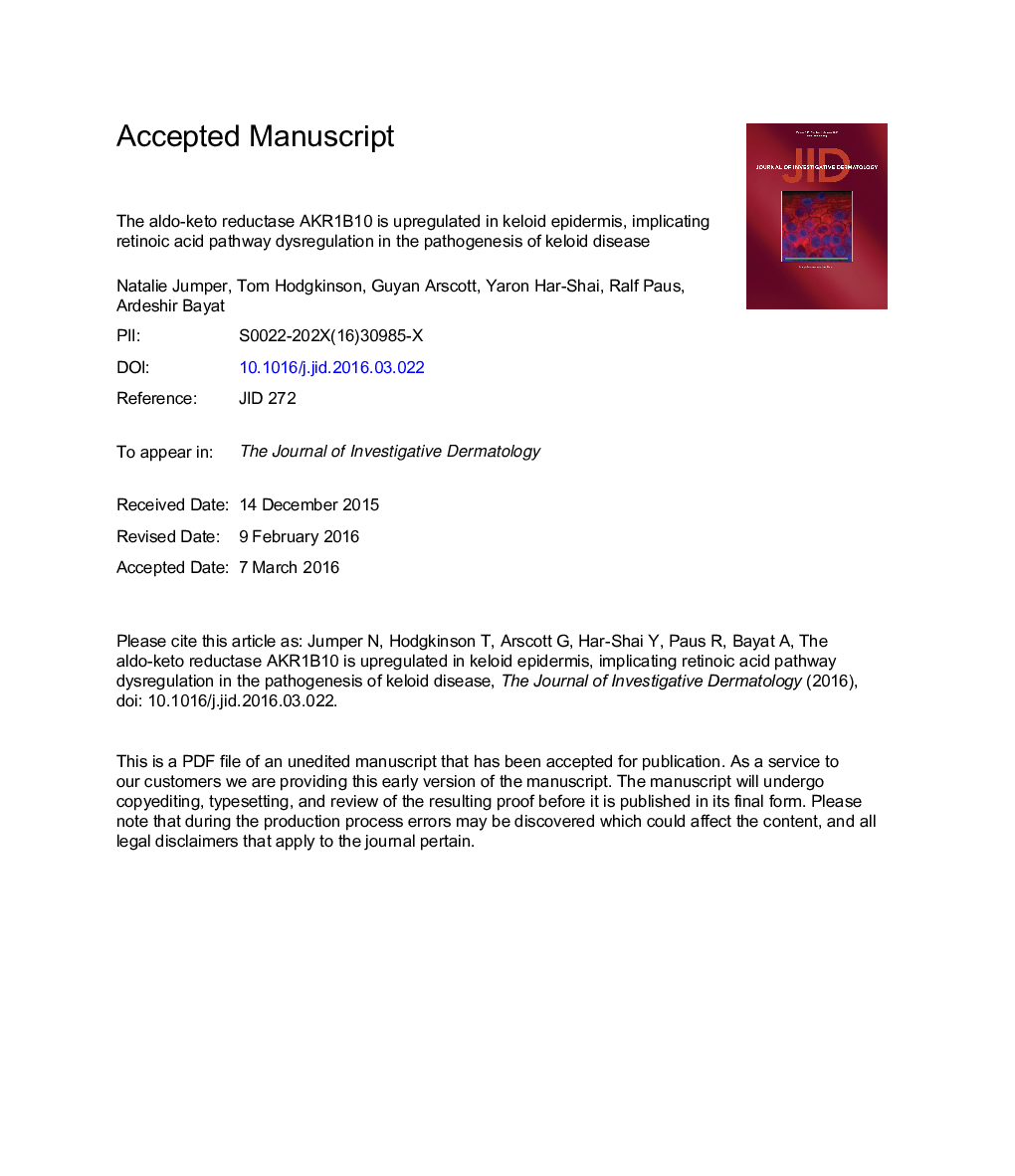| کد مقاله | کد نشریه | سال انتشار | مقاله انگلیسی | نسخه تمام متن |
|---|---|---|---|---|
| 6074377 | 1203484 | 2016 | 34 صفحه PDF | دانلود رایگان |
عنوان انگلیسی مقاله ISI
The Aldo-Keto Reductase AKR1B10 Is Up-Regulated in Keloid Epidermis, Implicating Retinoic Acid Pathway Dysregulation in the Pathogenesis of Keloid Disease
دانلود مقاله + سفارش ترجمه
دانلود مقاله ISI انگلیسی
رایگان برای ایرانیان
کلمات کلیدی
NSELCMTGF-βNSFqRT-PCRKeloid fibroblastCYP26ALDHAKR1B10NHEKCRABPaldehyde dehydrogenase - آلدئید دهیدروژنازKeloid disease - بیماری کلیویtransforming growth factor-beta - تبدیل فاکتور رشد بتاRetinoic acid - رتینوئیک اسیدlaser capture microdissection - لیزر ضبط میکرو دیسکسیونquantitative real-time PCR - واکنش زنجیره ای پلیمراز واقعی در زمان واقعیcellular retinoic acid binding protein - پروتئین مرتبط با اسید رتینوئیک سلولیnormal human epidermal keratinocytes - کراتینوسیت های اپیدرمی طبیعی انسان
موضوعات مرتبط
علوم پزشکی و سلامت
پزشکی و دندانپزشکی
امراض پوستی
پیش نمایش صفحه اول مقاله

چکیده انگلیسی
Keloid disease is a recurrent fibroproliferative cutaneous tumor of unknown pathogenesis for which clinical management remains unsatisfactory. To obtain new insights into hitherto underappreciated aspects of keloid pathobiology, we took a laser capture microdissection-based, whole-genome microarray analysis approach to identify distinct keloid disease-associated gene expression patterns within defined keloid regions. Identification of the aldo-keto reductase enzyme AKR1B10 as highly up-regulated in keloid epidermis suggested that an imbalance of retinoic acid metabolism is likely associated with keloid disease. Here, we show that AKR1B10 transfection into normal human keratinocytes reproduced the abnormal retinoic acid pathway expression pattern we had identified in keloid epidermis. Cotransfection of AKR1B10 with a luciferase reporter plasmid showed reduced retinoic acid response element activity, supporting the hypothesis of retinoic acid synthesis deficiency in keloid epidermis. Paracrine signals released by AKR1B10-overexpressing keratinocytes into conditioned medium resulted in up-regulation of transforming growth factor-β1, transforming growth factor-β2, and collagens I and III in both keloid and normal skin fibroblasts, mimicking the typical profibrotic keloid profile. Our study results suggest that insufficient retinoic acid synthesis by keloid epidermal keratinocytes may contribute to the pathogenesis of keloid disease. We refocus attention on the role of injured epithelium in keloid disease and identify AKR1B10 as a potential new target in future management of keloid disease.
ناشر
Database: Elsevier - ScienceDirect (ساینس دایرکت)
Journal: Journal of Investigative Dermatology - Volume 136, Issue 7, July 2016, Pages 1500-1512
Journal: Journal of Investigative Dermatology - Volume 136, Issue 7, July 2016, Pages 1500-1512
نویسندگان
Natalie Jumper, Tom Hodgkinson, Guyan Arscott, Yaron Har-Shai, Ralf Paus, Ardeshir Bayat,